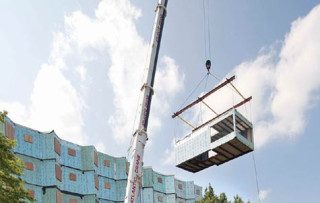The built environment sector is being urged to look ahead, to invest in digitalisation and innovation-driven growth and to groom local talent to tackle the trend of larger and more complex projects.
The Building & Construction Authority (BCA) projects the total value of construction contracts to be awarded to remain strong in 2020 with sustained public sector construction demand. The total construction demand is expected to range between S$28bn and S$33bn his year.
Public sector construction demand, which is expected to be between S$17.5bn and S$20.5bn this year, will make up about 60% of the projected demand. It is expected to be spurred by major infrastructure projectssuch as the Integrated Waste Management Facility, infrastructure works for Changi Airport Terminal 5, Jurong Region MRT Line and Cross Island MRT Line.
Private sector construction demand is projected to be between S$10.5bn and S$12.5bn this year, supported by projects such redevelopment, recreational schemes at Mandai Park, Changi Airport’s new taxiway and berth facilities at Jurong Port and Tanjong Pagar Terminal. The forecast for 2020 excludes any construction contracts by the two integrated resorts pending confirmation on the timeline and the phasing of the expansion projects.
Last year's total construction demand expanded by 9.5% to reach S$33.4bn, about S$1.4bn higher than the upper bound of BCA's 2019 forecast of S$27bn to $32bn. This was mainly due to a stronger than expected increase in industrial construction demand for petrochemical facilities despite the slowdown in manufacturing sector. Total preliminary construction demand last year for the public and private sector amounted to S$19bn and S$14.4bn respectively.
Construction demand is expected to hold steady over the medium term. Demand is projected to be between S$27bn and S$34bn per year for 2021 and 2022 and between S$28bn and S$35bn per year for 2023 and 2024.
The public sector will continue to lead demand and is expected to contribute S$16bn to S$20bn per year from 2021 to 2024, with building projects and civil engineering works each taking up about half of the demand. In addition to public residential developments, public sector construction demand over the medium term will continue to be supported by various mega infrastructure projects.

BCA expects private sector construction demand to stay at a moderate level in view of the likely continued global economic uncertainties and the current oversupply of private residential housing units. Nonetheless, the planned expansion of the two integrated resorts could provide further upside to private sector demand, depending on their eventual construction timelines and phasing.

Since the launch of the Construction Industry Transformation Map in 2017, the industry has been using newer and more advanced technologies to improve construction processes and methods. For example, more projects are adopting design for manufacturing and assembly (DfMA), where a substantial portion of work is now done in a controlled manufacturing environment before it is transported to site for assembly. The DfMA adoption rate by the industry shows an improvement from 22% in 2018 to about 30% in 2019, which is a good progress towards the target of 40% by 2020.
The BCA said that the public sector will continue to take the lead in adopting DfMA in its building projects, with 75% of all Housing & Development Board units launched in 2020 set to adopt DfMA methods, such as prefabricated pre-finished volumetric construction (PPVC) or advanced precast concrete systems (APCS).
With the positive outlook in the medium term, minister of state for national development and manpower Zaqy Mohamad urged the industry to continue investing in a skilled and competent local workforce who will lead and drive the built environment sector into the future.
BCA is also working with industry partners on initiatives to attract more fresh graduates and mid-career personnel into the sector. A skills framework to chart out career progression pathways which will be launched later this year.
Got a story? Email news@theconstructionindex.co.uk


